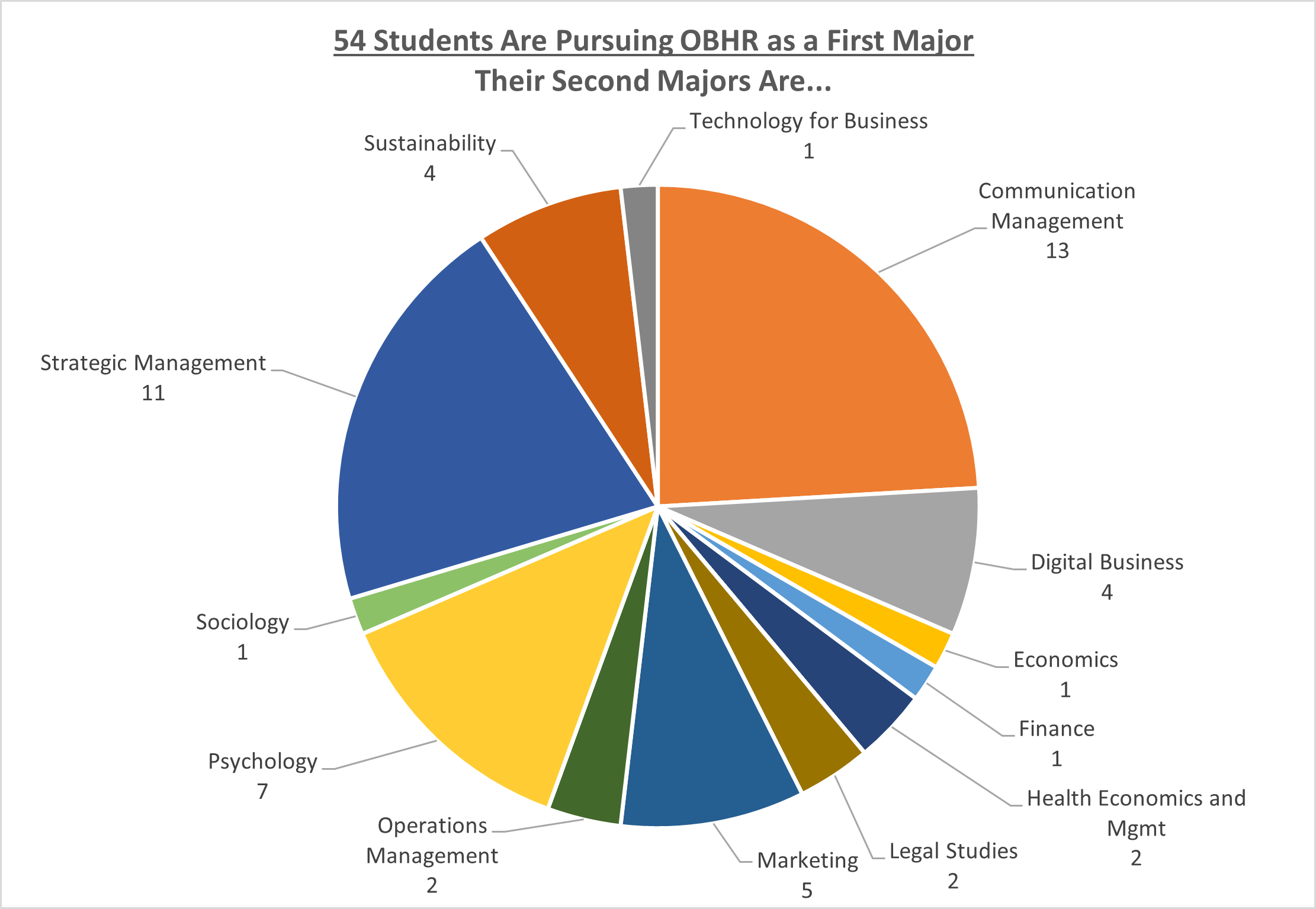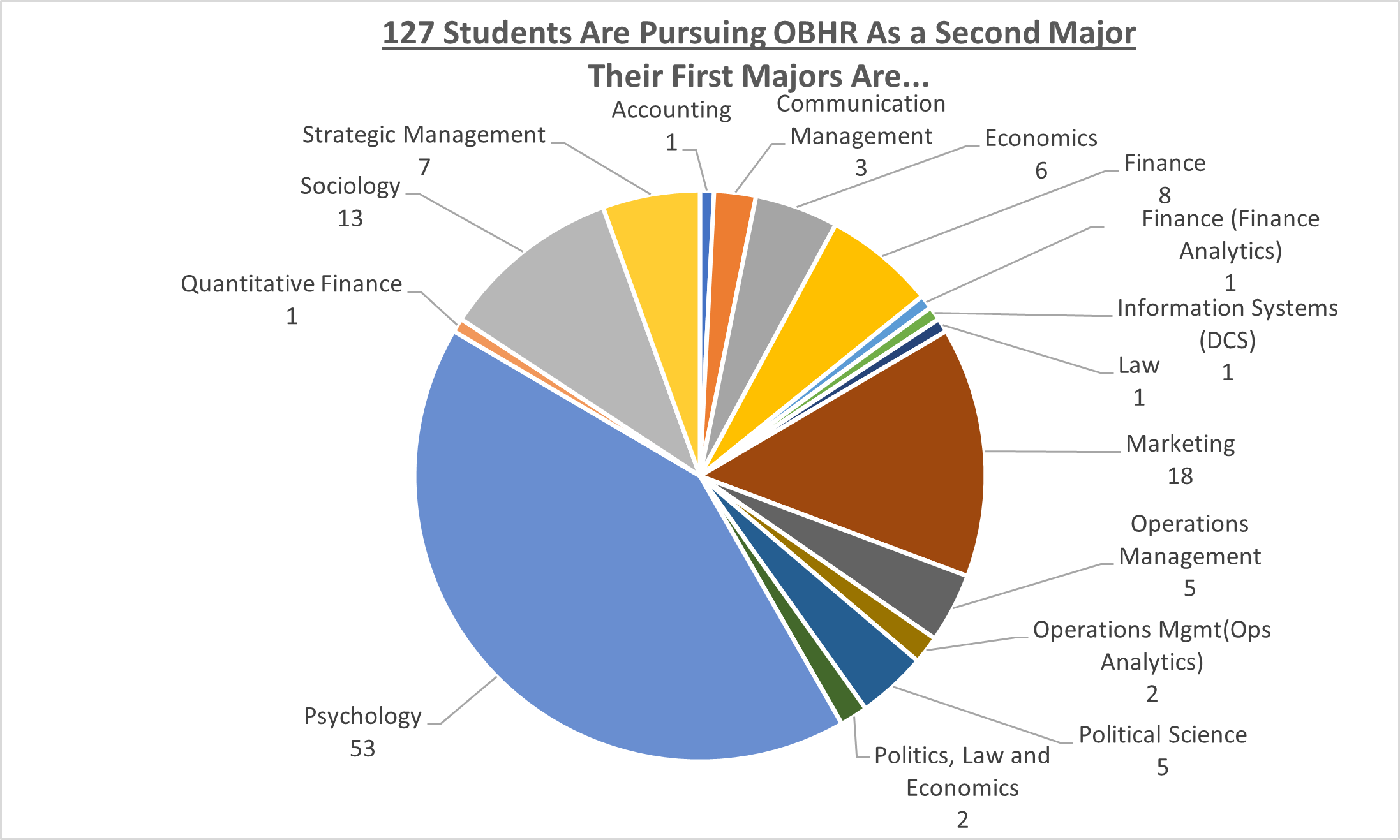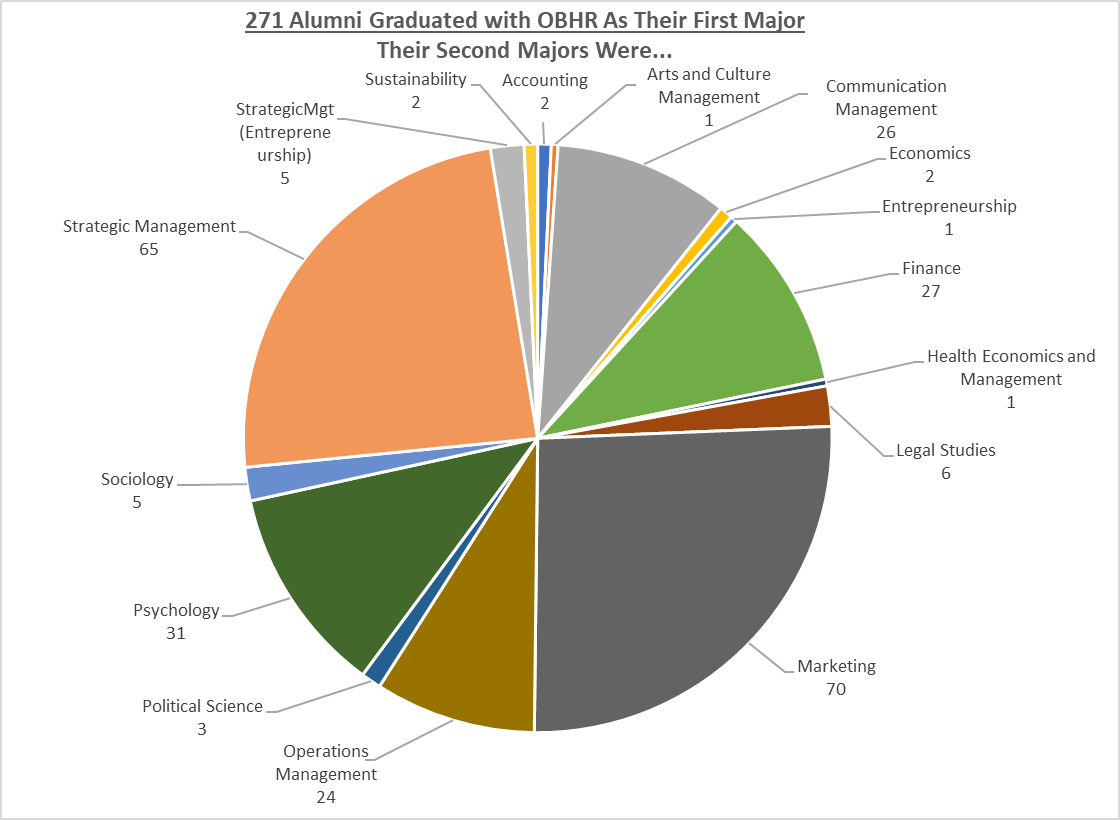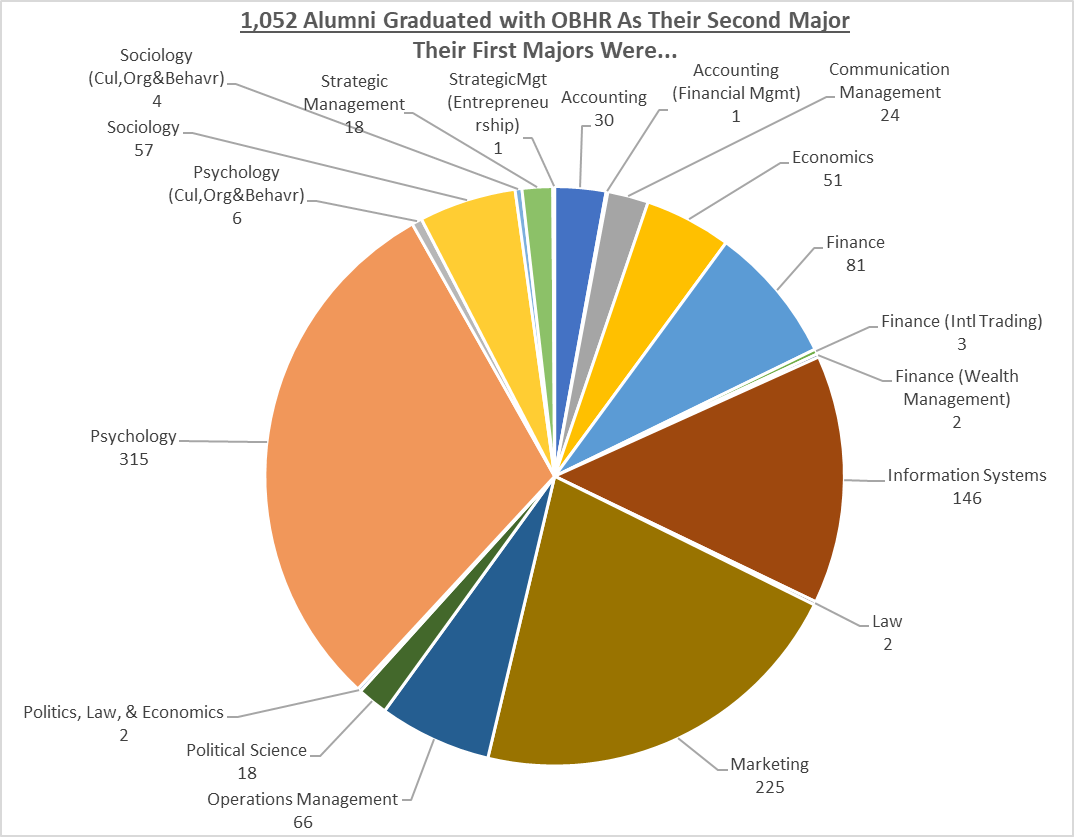The OBHR Major

About the OBHR Major
The OBHR Major presents students with the opportunity to gain evidence-based knowledge and skills for leading, managing, and collaborating with people in organizations. Our courses provide insights into a broad range of HR topics such as HR strategy, analytics, technology in HR, hiring, compensation, performance management, and training and development, and OB topics such as leading people and teams, politics within organizations, power and influence, cross-cultural management, organizational culture, decision making, organisational change, communication, group dynamics, motivation, negotiation, and personality. The OBHR Major can be approached with an HR focus that will prepare students for a career in areas such as HR management (Specialist, Generalist, or Business Partner), organisational development, or consulting. Alternatively, the OBHR Major can be approached with more of an OB focus to provide students with team, leadership, and organizational skills that will help them be more successful in any professional pursuit. The OBHR Major can also provide a foundation for graduate studies such as a Ph.D. in OB or HR, leading to a career in academia. Finally, the OBHR Major and OBHR courses are attractive to students who will work across a range of organizations - private sector, not-for-profit organisations or the government – and in a variety of roles as professionals or entrepreneurs specializing in finance, marketing, communications, operations, accounting, social services, computer sciences, information systems, and many others.
(Many thanks to the SMU OBHR Society for producing and filming the above video)
Why OBHR?
(A) OBHR is recommended as a major to students interested in a career in Human Resources or HR Consulting in companies ranging from MNCs to government, non-profit organisations and SMEs. Such students will take courses that expose them to cutting edge research and practices across a range of areas in human resources by taking courses such as Human Capital Management, Compensation, Training and Development, Talent Acquisition and Assessment, Technology Solutions for HR, HR Analytics, Human Capital Strategy, and Legal Environment and Employee Relations. We aim to produce graduates who have the potential not only to administer human resource solutions, but also to be an expert on talent management and involved in the strategic decision making process of their organisations. Graduates typically begin their careers as HR Specialists (e.g., in HR Analytics, Compensation, Organizational Development, Talent Management, or Talent Acquisition), HR Generalists, or Management/HR Consultants.
(B) An OBHR Major is also recommended for students who would like to gain knowledge, skills, and insights about leading and managing teams and organizations that will help them be more effective throughout their careers. Most SMU students pursue a major that provides them with deep technical skills in areas such as Finance, Marketing, Operations, Economics, Accounting, Information Systems, Computing, Communications, etc. Although these technical skills are important for formulating solutions to problems, a range of leadership, interpersonal, and team skills are extremely valuable for getting those solutions accepted and implemented within an organisation. OBHR Majors are able to take a range of OB courses such as Negotiating in Management and Business, Management of People at Work, Cross-Cultural Management, Decision Making, Knowledge Management, Group Dynamics, Power and Politics, and Organisational Change and Design. These courses provide advanced organisational skills that will enable students to better leverage the technical skills acquired in virtually any other major within SMU. Accordingly, the OBHR Major is particularly recommended to students seeking a double major.
(C) The OBHR Major can also provide a foundation and starting point for students who wish to pursue a career in research and teaching, for instance by obtaining a Ph.D. and then a position as a university professor. In addition to coursework in HR and/or OB as described above, such students are strongly encouraged to work with OBHR faculty members to gain experience in OBHR research methods, typically as a Research Assistant.
(D) University life is intended not only to prepare students for their careers, but also to provide them with opportunities to pursue learning and satisfy their curiosity in areas that they find intrinsically interesting. Accordingly, the OBHR Major and OBHR courses are recommended for students who are simply fascinated by, and want to learn more about people and organisations.
ORGANISATIONAL BEHAVIOUR & HUMAN RESOURCES MAJOR - Requirements
The list below serves as a general guideline on the requirements for the OBHR major. For the most updated and accurate list of OBHR courses offered, please visit OASIS > BOSS > Courses & Schedules > Browse Course Catalogue
Compulsory courses:
BBM Students:
- OBHR101 Management of People at Work (Business Core)
- OBHR201 Human Capital Management (OBHR Core)
- Five OBHR Electives from the list below.
Non-BBM students:
- OBHR101 Management of People at Work (Business Core)
- One additional LKCSB Business Core course from the following list
- OBHR201 Human Capital Management (OBHR Core)
- Five OBHR Electives from the list below.
Five OBHR Electives from the following:
^COR-OBHR1309 Negotiating in Management and Business
^ COR-OBHR1310 Working and Managing in a Digital World
^ COR-OBHR2247 The Science and Practice of Mindfulness at Work
OBHR202 Compensation
OBHR203 Talent Acquisition and Assessment
OBHR204 Training and Development
OBHR211 Governing, Managing & Protecting Knowledge in Organisations
OBHR212 Cross-Cultural Management & the Management of Diversity
OBHR215 Organisational Change & Design
OBHR220 Working and Leading in High-Performance Teams
OBHR224 Human Capital Strategy
OBHR225 Technology Solutions for Human Resources
OBHR228 The Psychology of Managerial Decision Making
OBHR232 Employment Law For Business Professionals
OBHR233 Employer Branding for HR
OBHR234 Power and Politics in Organisations
OBHR235 Human Resources Consulting
OBHR299 Special Topics in Organisational Behaviour
OBHR300 Human Resource Analytics
OBHR301 Group Dynamics in Organisations
^ Can be taken as a University Core or OBHR Elective
Please note that the list of OBHR electives provided here is not exhaustive. Also, the curriculum will be updated from time to time. For more details, you can refer to the School's website at www.business.smu.edu.sg
OBHR MAJOR - FAQs
No!
- OBHR is indeed the ideal major for pursuing a career in HR, typically as a single or first major.
- Meanwhile, many other students take OBHR as a second major to provide them with people and organizational insights and skills to complement other specializations such as Marketing, Finance, Operations, Strategy/Entrepreneurship, Accounting, Computing/IS, Economics, etc.
- And, some students pursue an OBHR Major simply because they are fascinated by and want to learn more about people and organisations.
The OBHR Major can be taken as a single major or paired as a first or second major with any other SMU major. Of our current 270 OBHR Majors, 89 (33%) are pursuing OBHR as a single major, 54 (20%) are pursuing OBHR as their first major, and 127 (47%) are pursuing OBHR as their second major:


Historically, the pattern is similar. Of the 1,637 SMU alumni who graduated with an OBHR Major since 2007, 314 (19%) graduated with OBHR as their single major, 271 (17%) graduated with OBHR as their first major, and 1052 (64%) graduated with OBHR as their second major:


Excellent! Our OBHR Major graduates can be found in virtually all sectors and types of organizations, including MNCs, consulting firms, government, nonprofit, SMEs, and startups, in a very wide range of roles. Click here for a list of the current top employers of our OBHR Major grads.
You will automatically be registered as a member of the OBHR Society. The OBHR Society organizes events and provides opportunities for networking with executives, alumni, fellow students, OBHR faculty, and other universities.
Indeed. The Institute for Human Resource Professionals (IHRP), provides a national certification framework ranging from Certified Associate (available to undergraduate students and entry-level professionals) all the way up to the IHRP Master Professional.
IHRP was established by the tripartite partners Ministry of Manpower, National Trade Unions Congress, and Singapore National Employers Federation, to professionalize and strengthen the HR practice in Singapore. In addition to certification, the IHRP provides professional development, Human Capital Diagnostic Tools and guidance for organizations, and a wide range of other resources, support frameworks, and opportunities for HR professionals and their organisations.
The OBHR Area is currently developing a proposal to add two tracks, one focused on HR Management and Analytics, and the other on People and Organizations. However, these are under development and not yet available to SMU students.
OBHR MAJOR – For Further Information
Further information about the OBHR Major can be found here:
Please also feel free to contact either of the OBHR Major Faculty Advisors: